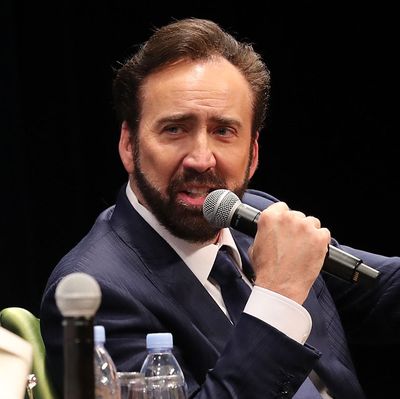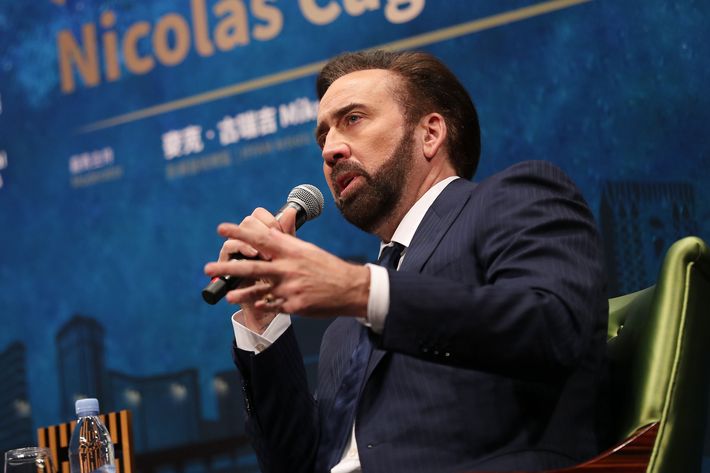
“This is called a Master Class,” Nicolas Cage announced, “which I find kind of ironic because I always see myself as a student. I’m a student of film performance, I always know I can learn something. And that compels me to take the risks — risks that perhaps people would advise me not to do!”
When a film festival hosts a “Master Class” with a special celebrity guest, it can go one of two ways. Either the star will apply the most literal form of the phrase, teaching a hands-on workshop with a group of young actors, or they’ll simply do a lengthy, in-depth interview about their career and craft. When the International Film Festival and Awards, Macau (IFFAM) announced that visiting “Talent Ambassador” Cage would host a Master Class while I was visiting China, I’ll confess to hoping for the former: What could be more entertaining (and informative!) than watching Mr. Cage coach young thesps on how to properly scream about the bees, or eat a live cockroach?
Alas, it was the latter, but Cage is an ideal subject for that type of event as well — after all, who has made as many seemingly inexplicable choices? Here are a few brief lessons gleaned from his one-hour IFFAM chat.
Don’t get too hung up on training.
“I do believe that you’re either born with it or you aren’t,” Cage said. “It’s a gift. You either have this ability to go into that film dimension and be charismatic or you don’t, and it’s not something you can really learn. It is something you can develop, through practice and experience. I only did three months of studying. That’s it, that was what I did, three months. But I learned by watching actors, and I learned by working and practicing and having visions and dreams of what I could do.”
Take risks.
In his early years, Cage recalls, he “wanted to try and see what I could do with film performance, and see if I could make it abstract, and surrealistic, and impressionistic. And kind of realize my fantasies growing up, watching movies that my father would play on an old movie projector — he would play these old, German expressionist films like Nosferatu, and The Cabinet of Dr. Caligari, and Fritz Lang’s Metropolis. They would give me nightmares, but they would stay in my psyche.
“And believe it or not, it was my aunt, Talia Shire, who said to me, ‘Y’know, Nicky, naturalism is a style.’ And then I became a believer in something I called art synchronicity — that something you do in one art form, like painting or music, you could do in another art form, like film performance. So this opened the door for me to take these risks.” And because they allowed him to take those big risks, he says his two favorite films are Face/Off and Vampire’s Kiss, calling the latter “the laboratory, the independent laboratory where I could do these facial expressions, do that kind of German expressionist Nosferatu behavior, but that was a little indie movie. When I was able to apply it in Face/Off, it was able to go out in a big studio film, and somehow it worked.”

Choose collaborators carefully.
Cage lucked out, he says, by working with filmmakers who were up for his experimentation: “It’s kind of remarkable, really, because I could very easily have been fired.” One of the most important, and most collaborative, was his Wild at Heart director David Lynch. “He would come to set, and he would say, ‘I want you to sing an opera song about cotton balls.’ And I would say, ‘Excuse me, David? You want me to do what now?’” But the moment he knew they were kindred spirits, Cage said, was when he asked him, “‘David, is it okay if I have fun when I’m performing?’ And he answered” — and at this point, Cage lapsed into a pitch-perfect impression of Lynch’s distinctive, golly-gee upper-register speaking voice — “‘Y’know, Nickster, it’s not only important that you have fun, it’s necessary! Because if you’re not having fun, Nickster, the audience isn’t having fun!’”
Keep ripe bananas on set.
Cage wasn’t thinking about winning an Oscar when he took the leading role in Leaving Las Vegas — if anything, he took it because he realized, “I’m never gonna win an Oscar anyway.” He performed most of the role sober, he recalled, but he also wanted to do “a couple of takes where I would have no idea where I was gonna go, and just be completely hammered” on camera. And this led to a helpful bit of advice from Tony Dingman, “a drunk and a poet,” who came in as his “drinking coach” for the film: “Did you know that John Barrymore, when he would have a drink while he was working, he would eat a ripe banana, and you can’t smell the alcohol on his breath?” So he took a couple of shots of bourbon, ate the banana, and sure enough — “Can’t smell the alcohol. Good to know.”
Remember why you’re there.
“Naturalism is something that I find is effective, and is certainly something I feel I can do, and I think you are able to do both,” Cage explained. But it’s important to “not just get trapped in that. To try to find ways of exploring and experimenting with other styles to give your performances effect — and remember that it’s a performance.”
And this, perhaps, is why Cage is so easy to meme, to dismiss, to even smear as a “bad actor” — because he’s one of the few, in this era of authenticity and hyper-realism, who is fully invested in the idea of performance. And unlike his thespian brethren, many of them self-conscious to a fault, Cage is willing to look silly, willing to fail spectacularly, in the pursuit of finding something new, or strange, or invigorating. Perhaps that (in addition to his widely-noted financial woes) is why he works so much; he can do a bunch of paycheck roles in straight-to-VOD genre movies the way a boxer goes to the gym, and then roar into the ring with a fully-felt, metal-as-shit, primal-scream turn in something like Mandy. And that, folks, is a performance.
Go for that Super 8 feeling.
So what drives Nicolas Cage? “I often talk about what I call the ‘Super 8 feeling,’” he said. “When my father gave my brother and I a tiny little Super 8 movie camera, and a little editing machine. And we were kids, in the backyard, and we would make movies. The joy of telling these little stories about a circus, or a superhero, and it was all about the joy of the film itself — it wasn’t about money, it wasn’t about awards. And that to me is the best feeling in the process of filmmaking. When I was making Raising Arizona, I said, ‘Y’know, I’m getting that Super 8 feeling,’ and Joel [Coen] said, ‘Oh, that’s good, keep that going!’ And when I did Mandy, I mentioned the Super 8 feeling to Panos [Cosmatos], and he also liked the idea …
“And I think that’s what it really is. If you go into a movie thinking you’re gonna get an Oscar from it, or simply because you’re gonna get tons of money — not that both aren’t important! — then you’re going about it the wrong way. It’s the joy of the filmmaking process itself, that’s what stimulates me.”

